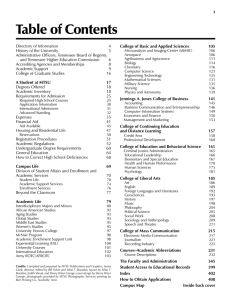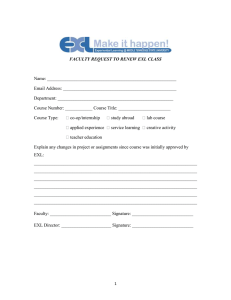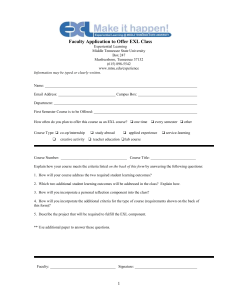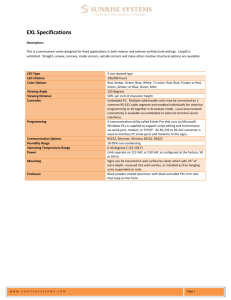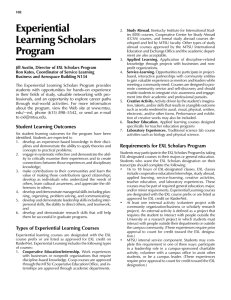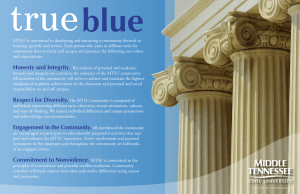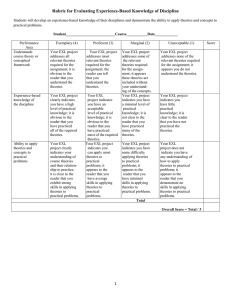Experiential Learning Scholars
advertisement
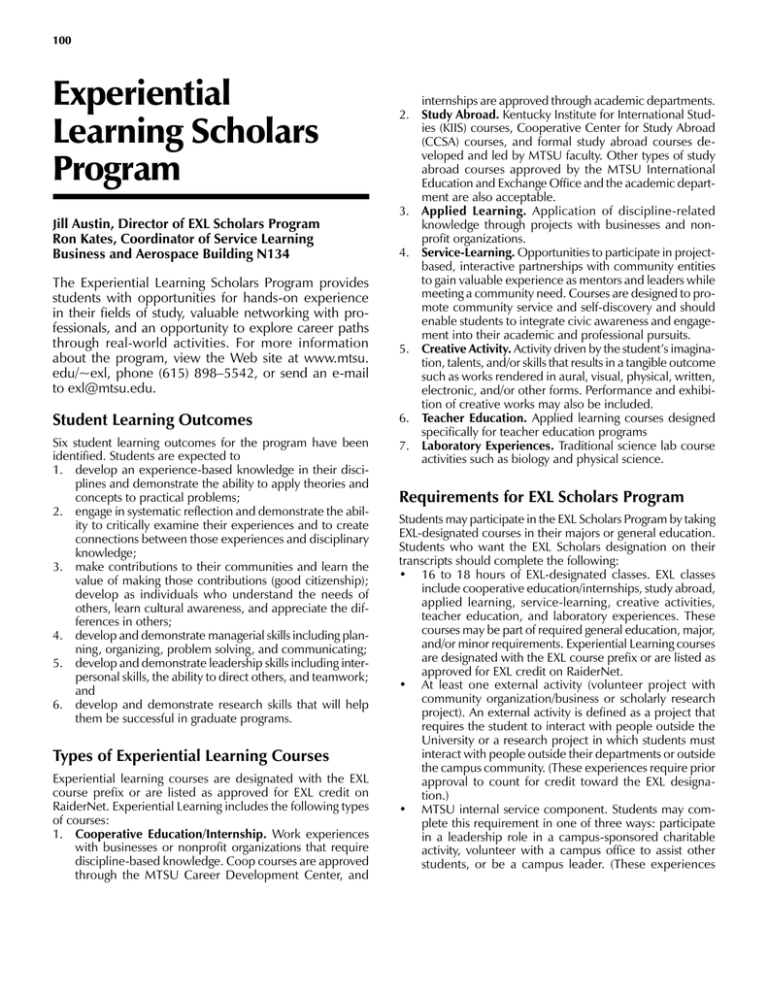
100 Experiential Learning Scholars Program Jill Austin, Director of EXL Scholars Program Ron Kates, Coordinator of Service Learning Business and Aerospace Building N134 The Experiential Learning Scholars Program provides students with opportunities for hands-on experience in their fields of study, valuable networking with professionals, and an opportunity to explore career paths through real-world activities. For more information about the program, view the Web site at www.mtsu. edu/~exl, phone (615) 898–5542, or send an e-mail to exl@mtsu.edu. Student Learning Outcomes Six student learning outcomes for the program have been identified. Students are expected to 1. develop an experience-based knowledge in their disciplines and demonstrate the ability to apply theories and concepts to practical problems; 2. engage in systematic reflection and demonstrate the ability to critically examine their experiences and to create connections between those experiences and disciplinary knowledge; 3. make contributions to their communities and learn the value of making those contributions (good citizenship); develop as individuals who understand the needs of others, learn cultural awareness, and appreciate the differences in others; 4. develop and demonstrate managerial skills including planning, organizing, problem solving, and communicating; 5. develop and demonstrate leadership skills including interpersonal skills, the ability to direct others, and teamwork; and 6. develop and demonstrate research skills that will help them be successful in graduate programs. Types of Experiential Learning Courses Experiential learning courses are designated with the EXL course prefix or are listed as approved for EXL credit on RaiderNet. Experiential Learning includes the following types of courses: 1. Cooperative Education/Internship. Work experiences with businesses or nonprofit organizations that require discipline-based knowledge. Coop courses are approved through the MTSU Career Development Center, and internships are approved through academic departments. 2. Study Abroad. Kentucky Institute for International Studies (KIIS) courses, Cooperative Center for Study Abroad (CCSA) courses, and formal study abroad courses developed and led by MTSU faculty. Other types of study abroad courses approved by the MTSU International Education and Exchange Office and the academic department are also acceptable. 3. Applied Learning. Application of discipline-related knowledge through projects with businesses and nonprofit organizations. 4. Service-Learning. Opportunities to participate in projectbased, interactive partnerships with community entities to gain valuable experience as mentors and leaders while meeting a community need. Courses are designed to promote community service and self-discovery and should enable students to integrate civic awareness and engagement into their academic and professional pursuits. 5. Creative Activity. Activity driven by the student’s imagination, talents, and/or skills that results in a tangible outcome such as works rendered in aural, visual, physical, written, electronic, and/or other forms. Performance and exhibition of creative works may also be included. 6. Teacher Education. Applied learning courses designed specifically for teacher education programs 7. Laboratory Experiences. Traditional science lab course activities such as biology and physical science. Requirements for EXL Scholars Program Students may participate in the EXL Scholars Program by taking EXL-designated courses in their majors or general education. Students who want the EXL Scholars designation on their transcripts should complete the following: • 16 to 18 hours of EXL-designated classes. EXL classes include cooperative education/internships, study abroad, applied learning, service-learning, creative activities, teacher education, and laboratory experiences. These courses may be part of required general education, major, and/or minor requirements. Experiential Learning courses are designated with the EXL course prefix or are listed as approved for EXL credit on RaiderNet. • At least one external activity (volunteer project with community organization/business or scholarly research project). An external activity is defined as a project that requires the student to interact with people outside the University or a research project in which students must interact with people outside their departments or outside the campus community. (These experiences require prior approval to count for credit toward the EXL designation.) • MTSU internal service component. Students may complete this requirement in one of three ways: participate in a leadership role in a campus-sponsored charitable activity, volunteer with a campus office to assist other students, or be a campus leader. (These experiences require prior approval to count for credit toward the EXL designation.) • Documentation of completion of EXL activities through an e-portfolio (EXL 4000). • Participation in EXL program assessment activities such as completion of surveys. Campus Partnerships with EXL For additional information about activities related to experiential learning, review activities offered through the following programs. American Democracy Project – www.mtsu.edu/~amerdem Cooperative Education – www.mtsu.edu/~cooped Undergraduate Research – www.mtsu.edu/~ research/urc.html Study Abroad – www.mtsu.edu/~mtabroad/ McNair Scholars – www.mtsu.edu/~mcnair Academic Departments and Colleges Courses in Experiential and Service Learning [EXL] See back of catalog for course descriptions. 101 University Courses University courses are offered to address specific learning goals and are taught by faculty throughout the various colleges of the University. University Seminar MTSU offers a special course to help freshman students develop tools needed for success. This seminar course helps new students appreciate the value of a higher education, learn about the numerous campus resources available to them, clarify their career goals, and refine the academic skills required of the successful college student. A course to facilitate a successful transition for transfer students is also offered. University Seminar can be taken as an elective and counted toward the 120-semester-hour minimum graduation requirement. Undeclared freshmen with 0-24 credit hours will be required to enroll in University Seminar 1010. More information can be obtained from Dr. Marva Lucas Peck Hall 202 Middle Tennessee State University Murfreesboro, TN 37132 Courses in University Seminar [UNIV] See back of catalog for course descriptions.
